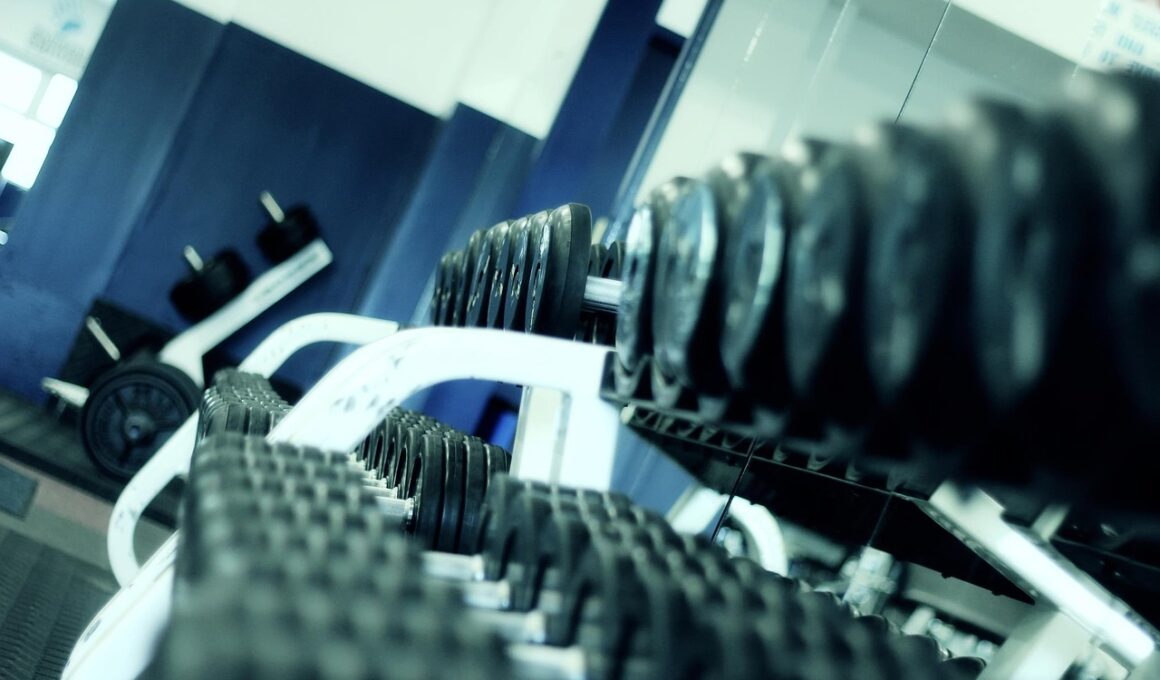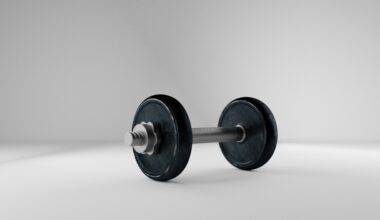The Importance of Rest and Recovery Before a Bodybuilding Competition
Rest and recovery are often overlooked in the world of bodybuilding, especially as competitors prepare for a competition. However, they play a crucial role in achieving the peak condition for the stage. In the weeks leading up to the event, emphasis should not solely focus on training intensity, but also on allowing muscles adequate time to recover and rejuvenate. This period of recovery helps to prevent injuries and promote overall muscle growth by letting fibers heal effectively. By allowing the body to rest, athletes can improve their performance and overall results. While it may seem counterintuitive, incorporating rest days helps to maximize workout effectiveness. Schedule these rest days strategically alongside intense training sessions, ensuring a balanced approach to muscle fatigue and recovery. Additionally, quality sleep is vital. It aids in hormone regulation, muscle repair, and prevents mental fatigue. Take note of individual body’s response and adjust rest periods as needed. This can include active recovery, like light cardio, yoga, or stretching, further enhancing muscle recovery. Remember, recovery is just as essential as hard training for bodybuilding success.
As competition day approaches, it becomes even more critical to listen to your body’s needs. Timing your rest days appropriately can lead to better muscle fullness, appearance, and strength during competition. Strategies such as tapering workouts, reducing volume while maintaining intensity, help preserve muscle while minimizing fatigue. Competitors might consider reducing training frequency to allow for optimal recovery. Furthermore, nutrition plays an immense role in recovery and overall performance. Proper hydration, balanced macronutrients, and timing of meals can significantly impact how well the body recuperates. Prioritize protein intake to support muscle repair and growth, while carbohydrates should be regulated to ensure energy levels remain high. Integrating anti-inflammatory foods can also benefit recovery by assisting in reducing muscle soreness and enhancing the healing process. Additionally, employing techniques such as foam rolling or yoga may further enhance muscle elasticity and blood flow. Practicing these techniques during recovery can promote effective muscle function and readiness. Keep in mind, under-recovery could lead to a ‘flat’ appearance on stage, making adequate rest and recovery essential for success.
Listening to Your Body
Undoubtedly, each individual athlete’s body responds differently to stress and recovery, making it essential to recognize personal limits. Pay attention to signs of fatigue, stress, or burnout; adjusting your training accordingly is vital for long-term success. Feeling overly sore or fatigued may call for a longer recovery period, allowing muscles to repair fully. Communicate openly with trainers or coaches regarding any concerns about recovery. It’s crucial to maintain alignment with your overall competition goals. Moreover, many athletes underestimate the mental aspect of competition preparation. Mental rest and relaxation techniques are paramount. Practices such as meditation, visualization, or simple deep-breathing exercises can significantly impact mental preparedness. Visualizing success on stage can enhance confidence levels and alleviate pre-competition anxiety. This mental strength combines with physical readiness creates a well-rounded competitor poised for success. Balancing both aspects ensures athletes present their absolute best on stage. Therefore, implementing mental recovery efforts alongside physical rest can create a comprehensive approach. Ultimately, this leads to a more focused and confident performance, showcasing the hard work put into the entire preparation process.
Understanding the biological role of rest in muscle recovery can lead to improved overall performance. During rest, the body undergoes a process called muscle protein synthesis, crucial for building and preserving muscle tissue. Growth hormone levels peak during deep sleep, making it the ideal time for recovery. The body will replenish energy stores used during intense workouts and restore balance to hormonal levels. Adequate recovery also significantly decreases the risk of injury, allowing competitors to continue training effectively without setbacks close to competitions. It is essential to prioritize rest days, ensuring a routine that allows muscles to recover and gain strength for performance. Neglecting rest could lead to overtraining, resulting in fatigue and decreased motivation. This may inadvertently impact physical appearance on stage and overall competition readiness. Instead, embracing both the intensity of training and the relief of recovery can help maximize the outcomes of bodybuilding efforts. Personalizing recovery strategies is beneficial. Techniques such as contrast baths, massages, and varying workout tempos can effectively aid recovery and enhance muscle endurance. Ultimately, balancing training and recovery efforts sets the stage for optimal performance.
The Role of Nutrition
Nutrition must be viewed as a foundational element of recovery. The body needs the appropriate fuel for muscle recovery after extensive training sessions. This means prioritizing meals rich in quality proteins, healthy fats, and carbohydrates. Pre- and post-workout nutrition should never be overlooked, as they are directly related to recovery processes. Consuming protein-rich meals enhances muscle protein synthesis, which is crucial after workouts. Furthermore, athletes need to remain mindful of hydration. Dehydration can severely impede muscle recovery. Therefore, drinking adequate water and electrolyte-filled beverages is essential during rigorous training times. Alongside food intake, supplementation may also play a role in aiding muscle recovery. Some bodybuilders choose to incorporate vitamins, minerals, or protein powders that help bridge any nutritional gaps. Creating a detailed nutrition plan can ensure competitor recovery is maximized. Moreover, exploring new foods or recipes could yield additional benefits, keeping the diet fresh and appealing. Having a well-planned nutrition strategy enables athletes to recover faster and prepare for competitions more efficiently. Combining all these elements can lead to a stronger performance.
Recovery isn’t just a component of training; it’s an integral part of bodybuilding competition success. Making the conscious choice to prioritize rest can set competitors apart. Understanding physiological aspects of recovery, as explored previously, equips athletes with a clearer perspective. Furthermore, an effective recovery protocol can instill a sense of discipline among competitors. Here, consistency in respecting rest days aligns with a professional mindset and goals. Moreover, integrating proper recovery into a training program enhances the overall effectiveness. As bodybuilders prepare for competition, recognizing the value of rest and recovery can be invaluable. All too often, intensity overshadows recovery in training regimens, ultimately diminishing potential gains. Create a schedule where rest is just as essential as both food consumption and workout plans. Athletic success requires a holistic approach, and incorporating active rest strategies alongside consistent training will prove beneficial. Bodybuilders competing at elite levels understand this and often share invaluable insights on incorporating effective recovery practices. As such, sharing tips on rest and recovery can regularly inspire fellow athletes aiming for peak performance during the competition.
Conclusion
In conclusion, understanding the importance of rest and recovery is a game-changer for any aspiring bodybuilder. Leading up to competitions, competitors must prioritize adequate rest and smart recovery strategies to optimize performance. By acknowledging the balance between intense training and restorative practices, athletes maximize their overall effectiveness on stage. Personalizing recovery protocols, focusing on rest properly, and employing proper nutritional support can elevate competitors, allowing them to present their best selves at competitions. Taking the time to rejuvenate physically and mentally should never be seen as a weakness. Rather, it’s a testament to dedication, discipline, and approach to bodybuilding. Continuous growth and improvement hinge upon an integrated recovery methodology. With attention to rest and nutrition, competitors become better prepared to face not only the physical demands but also the mental challenges that competitions present. Ultimately, cultivating a deep respect for the recovery process will aid in achieving success over time. By nurturing both body and mind, athletes can ensure continued progress and a powerful presence on competition day. Therefore, rest and recovery emerge as vital components in the journey to bodybuilding excellence.
In a competitive landscape where every detail matters, fostering a strong recovery strategy can be the difference between winning and losing. Bodybuilding is not solely about strength in the gym; it encompasses the holistic management of mind, body, and nutrition. Athletes must recognize that a true champion’s mindset includes understanding their personal needs for recovery. In practical terms, this means scheduling regular assessments of personal performance and emotional state during training. Adopting a proactive recovery plan can lead to gains that are both sustainable and meaningful. Eventually, competitors will appreciate that recovery leads them toward achieving their individual goals. By taking rest seriously, athletes can build a schedule that supports long-term growth, ensuring they are not merely competing but excelling. Ultimately, a culture of recovery fosters resilience, improves focus, and increases overall satisfaction in the bodybuilding journey. This shift in perspective can revolutionize how bodybuilders view their preparation for competitions. With dedication to recovery as guidance, they can approach the stage more prepared and confident than ever, showcasing the quintessential essence that defines bodybuilding excellence.


